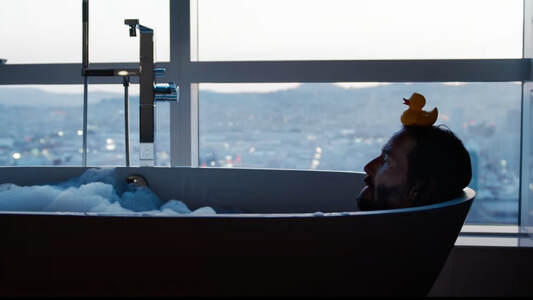C | Thomas Anderson runs into a familiar lady at a coffee shop. Directed by Lana Wachowski Starring Keanu Reeves and Carrie-Anne Moss Review by Jon Kissel |

 If the Matrix Resurrections is to be believed, every property that belongs to a movie studio will be recirculated and rehashed ad infinitum. A creator can take the paycheck and churn out some mindless pap that evaporates the second the viewer leaves the theater, or they can see what they can get away with and make something visionary and idiosyncratic. The best scenario is Mad Max: Fury Road, a film that somehow sharpened its action choreography on top of a visceral, heart-grabbing hymn about the righteousness of freedom. The worst case is 2011’s Robocop, a soulless cash grab and a thin shadow of its former self. To Lana Wachowski’s great credit, she won’t let her, and her absent sister Lily’s, work be thrown to some director-for-hire, and she made a fourth entry that is exactly what she wanted to make. Kudos for receiving a reported production budget of $190 million and making fun of the studio that gave it to you. However, Lana, and maybe Lilly too, have lost whatever it was that produced the Matrix 22 years ago, and Matrix Resurrections is a sappy academic exercise in search of stakes and compelling interest. The original Matrix, and at least Matrix Reloaded, started with world-building and action and the charisma of its actors and layered philosophy and meta-commentary on top of it. Matrix Resurrections inverts the pyramid, boring the viewer with the commentary and turning everything that follows into an unmotivated slog.
0 Comments
 Australian director Jane Campion has been in business since the 80’s but as far as anyone but the diehard cinephile is concerned, she’s only got The Piano to her name. Her other films don’t have much of a footprint, despite starring major actors like Nicole Kidman, Meg Ryan, and Kate Winslet. They hover in the 40-60% Rotten Tomatoes range, marking them as difficult and contentious amongst the critical community. However, the wake of her latest, The Power of the Dog, would have a viewer believe that she’s one of the greatest living filmmakers, accompanied as it is by retrospectives and reappraisals of her work. Having only seen The Piano, as well as her Top of the Lake miniseries with Elisabeth Moss, and liking and admiring them both, Campion’s a director who hasn’t missed but at the same time, I’ve never felt a need to seek out something like Bright Star or The Portrait of a Lady. After The Power of the Dog, I can comfortably slot her into a place of respectability and precision, though she continues to have never made a movie that’s knocked me off my feet. Her take on a Western, and her first film without a female lead, is impeccably made and features a better twist than anything in a Shyamalan movie, but it’s also much slighter than I expected and almost beneath someone of Campion’s reputation. This isn’t a mysterious movie with characters whose motives are always cloudy and unknown even to themselves, but is instead fairly heavy-handed ethics-wise with whiffs of slobs-versus-snobs dynamics from the National Lampoon days. Campion sure does know how to make the sensory feeling of something come through on screen, though.
 Wong Kar-wai, master of the slow-burn romance, can no longer ignore his Hong Kong roots in The Grandmaster, a film that surrounds Wong’s signature unrequited romances with the wire-fu style of Hong Kong action cinema. Sold as a biopic of Ip Man, the eventual trainer of Bruce Lee, The Grandmaster is only tangentially concerned with him, such that his children die off-screen. In Wong’s vision, Ip Man isn’t a complicated man, albeit one who makes the uncomplicated look incredible. Instead, Wong broadens his focus for a consideration of 20th century China and all the tumult it experienced during the first half of Ip Man’s life. The Grandmaster illuminates little of Ip Man, starting as it does at a point when he’s already an expert at Wing Chun kung fu. Its greater success is Wong’s technical perfection in the service of a national metaphor about collective destruction.
 There’s a distinct possibility that a major international conflict will erupt in the South China Sea over which country owns this or that chain of tiny islands. Taiwan continues to float out in its waters, a thorn in China’s side and a constant counter-example to authoritarian rule, at least in recent history. In the year 4000, assuming a future where China takes over these islands and whatever other land it considers itself the rightful owners of, someone might very well make a historical epic justifying the bloody wars of unification as the only way to have true peace. Future humans watching that movie might be as queasy as I am after watching Hero, Zhang Yimou’s stunning collection of top-tier actors and martial artists that is also a politically untenable argument for iron-fisted top-down control. Iconic tableaus and peak wu xia wire work bring the viewer in for an entrée of herrenvolk unification. |
AuthorsJUST SOME IDIOTS GIVING SURPRISINGLY AVERAGE MOVIE REVIEWS. Categories
All
Archives
April 2023
Click to set custom HTML
|